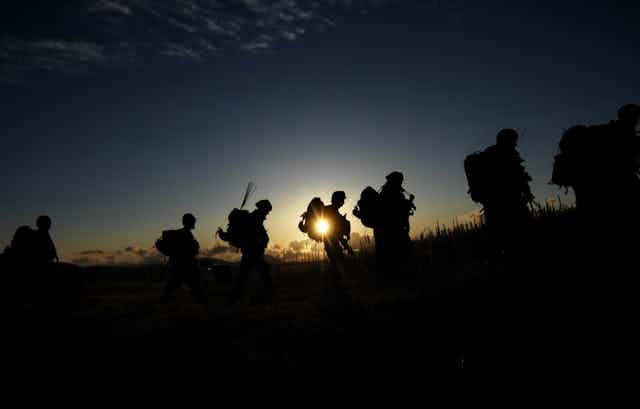That evening, the sun sank swiftly. The tank which blocked our way was briefly silhouetted by the last sharp rays, before it disappeared into the gloom. It was still there, but the detail of track and gun turret could no longer be seen. Eventually, whoever was giving the orders decided we could go. The material we had filmed would not make it onto that night’s news.
It was October 2003. I was working as a BBC correspondent in the Gaza Strip. I was trying to return from Rafah, at the territory’s southern edge, to my office in Gaza City. A major Israeli military operation, code named “Root Canal”, was underway. The army strictly controlled access to the area. My colleagues and I had got into Rafah without too much trouble, but had waited several hours to get out. By the time we did, our material was late.
That hardly bothered the soldiers who held us up. They weren’t wondering which bulletins we were missing. They probably weren’t too bothered that they were stopping us getting our report out, either. Israeli army operations in Gaza often involve civilian deaths. In such a densely populated strip of land, where the people are not permitted to leave, it can hardly be otherwise.
Operation Root Canal was targeting tunnels running under Gaza’s border with Egypt. That day, we had heard the stories of Rafah residents whose houses had been destroyed because they were suspected of concealing tunnel entrances, or of being used as firing positions – or just because they were unlucky enough to be too close to Israeli army posts, at a time when the Israeli army were going on the offensive against armed Palestinian groups.
Whatever the reasons given for the operation, the consequences for local residents would not exactly look good on the international news. No army wants that kind of coverage.
Bad press
Now, apparently troubled by recent incidents of soldiers caught on camera breaking the law – Israeli soldier Elor Azaria’s shooting to death a wounded, prone, Palestinian attacker being perhaps the highest profile example – one Israeli politician wants to place strict legal limits on the filming and photographing of soldiers.

Robert Ilatov is a member of parliament for the right-wing nationalist party Yisrael Beitenu (which translates as “Israel, our home”). His plan has already been criticised by journalists’ organisations: “It constitutes a serious breach of the freedom of the press, as it precisely criminalises the work of journalists”, in the view of the International Federation of Journalists.
The Israeli–Palestinian conflict has been the focus of extensive international reporting since the middle of the last century. “Every single word is scrutinised”, said Crispian Balmer, then Jerusalem bureau chief for Reuters, of the challenges of covering the conflict, in an interview for my book Headlines from the Holy Land.
The bloodshed in Syria may have drawn media and diplomatic resources away from Israel, Gaza and the West Bank in recent years. But the Israeli army’s killing of Palestinian protesters at the Gaza border fence last month shows that the conflict can still grab the world’s attention. Even in our image-saturated world, pictures seem to retain a particular power – easily shared as they are on social media. This power is presumably what concerns Ilatov.
Bad reputation
The opposition to his plans is not confined to international organisations. Israel’s leading liberal newspaper, Ha'aretz, has condemned the bill as “dangerous”, noting that “anyone who breaks the law is subject to five years in prison”. Yet censorship on reporting the activities of armies is nothing new. Its rules are often characterised by vagueness.
British correspondents during World War I were forbidden to publish any, “false statements or utterances ‘likely to cause disaffection to His Majesty’,” as Susan Carruthers put it in her book The Media at War. The bill before the Israeli parliament echoes that lack of clarity, warning civillians and journalists alike against “undermining the morale of Israel’s soldiers and residents”.
Although they are rarely required to conform to it, any international journalist granted an Israeli Government Press Card has to agree to “accept the censorship declaration”. This new legislation would be more extensive, covering not just the foreign media, but anyone at all.
“Being a spectator of calamities taking place in another country is a quintessential modern experience”, wrote Susan Sontag in Regarding the Pain of Others. Social media have given us the chance to see ever more of our world. As with all new media, governments and armies seek to influence the messages they bring.
Today, leaders of the world’s most powerful countries feel at liberty to sneer at any journalists who question them. Adding extra layers of censorship to that scorn will hardly help audiences to understand this complex and unstable age. Besides, legislation has limited power to stop what technology has started. While military victories may enhance a country’s reputation, the manner in which they are achieved may also tarnish it. Criminalising journalism definitely does.

